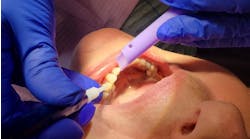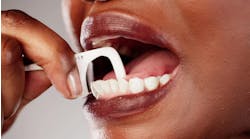Editor’s Note: The article below originally appeared in the October 1989 issue of RDH magazine. Although both RDH and Dental Economics are now published by PennWell Corp., they were published by different companies in 1989.
By Irene Woodall
How would you respond to the following statement: Because of the shortage of dental hygienists, the educational requirements for hygienists should be reduced to one year?
An article which appeared in a recent [1989] issue of Dental Economics featured responses from dentists around the country. Be sure and take the time to read the article to find out what grassroots dentists are saying. It is encouraging and fits my notions of what clinical dentists would say if interviewed by someone other than their American Dental Association officers.
Basically, the vast majority of the respondents said that educational requirements should not be lowered and that, if anything, the quality and length of educational preparation should be improved. They commented that it was important to have hygienists prepared as professionals and not just as tooth cleaners. They also noted that if all a hygienist was going to be doing was scaling supragingivally all day, then courses in anatomy and instrumentation would be adequate. But, if they are going to be expected to project the image of a quality staff member who knows the importance of health and the signs of disease, then shortening the prescribed program is a folly.
With all the political rumblings about shortening programs and establishing preceptorship training in various states, these views are a relief. There has been much lobbying by some segments of the dental profession to train their own hygienists to scale teeth under their close supervision. Many dentists are upset about this trend and are willing to fight it. But just as many, and perhaps more, are more likely to view the trend with dismay and to hire only hygienists who are properly trained. In other words, they are not willing or motivated to take action to help stop the movement toward lowered educational standards.
Sense of Security
This is understandable in light of the way many dentists (and hygienists) think. If they are happy in their own practices and see competent people surrounding them and feel a good sense of security about how they deliver care and manage their practices, they are likely to see these outside threats as having little impact on their lives. Don't many of us feel this way? If I'm secure, then I'm less inclined to take action to change a situation that appears to have little impact on my security. Thus, there are many outstanding professionals who look at dental politics from a safe distance, shaking their heads but taking no official stand. Many hygienists would rather leave the profession than have to get involved in the politics of change. This is no doubt true of some dentists as well.
As a result, we have small groups who perhaps are not very representative of the entire profession working diligently to change what no one else believes needs fixing. Or they are implementing strategies for change that appear to cause more harm than good.
It is difficult to view the issue of shortening our education from a dispassionate distance. Dentists may take vows to hire only properly educated hygienists and try to sidestep the issue. But dental hygienists are not in such a convenient situation. Ultimately, neither is the individual dentist.
Hygienists are faced with the dilution or pollution of their profession with people who received substandard education. The perceived quality of the profession is diminished. No longer can the public assume that the person who examines their tissues and works to help prevent or treat periodontal disease is properly prepared to make judgments or even use those sharp instruments without damage. One of the cultural characteristics of dental hygienists is the amount of time and care spent using instruments sub gingivally to detect disease and to treat it. Unfortunately, most dentists spend far less time perfecting those skills.
A Step Backward
Envisioning today's dentists teaching fledgling would-be hygienists to perform instrumentation is a nightmare for me. That doesn't mean they aren't well intentioned dentists. I just don't have much confidence that they know as much about curette shape, adaption and root anatomy as well educated dental hygienists. Such a step backward is difficult to support during an era of increased attention on diagnosis and treatment of periodontal disease. Also, those dentists interested in implementing preceptorship programs in order to train their own personnel probably will not be interested in imparting much of the science behind the procedures that hygienists perform. So we will have a plethora of hygienists entering our profession who don't know why they are doing something and who don't have the education to recognize variations from the usual or the normal that would require modifications in care. I frankly don't want that to happen.
It doesn't get much better to consider a one-year formal program as the standard length program. Do you remember how hard you worked in order to complete the program in two or more years? Would you want a person who had finished a one-year program to be your hygienist?
The problem is even larger than sorting out who was trained for one year or two and who was preceptor trained. As the esteem of the profession diminishes with the influx of substandard personnel, our quality members are going to feel the pinch of decreased salaries and decreased self-esteem. If we have seen an egress of hygienists from the profession in the past 10 years, wait until the whole basis of the profession has been eroded. I can't imagine that many of us will feel good about watching dental hygiene change in character and quality.
Responding to the Situation
What frustrates me is that those people working so hard to lower our educational standards do have a hidden agenda of keeping us barefoot and in our places. If hygienists have less education they can be paid less. If they have less education they are less likely to try to make decisions that threaten the dentist's self-esteem. So often the people working for this kind of change have never worked with a quality hygienist or have never given the hygienist the authority and opportunity to make decisions and grow professionally so that the team has a fully contributing member to work with the patients delivering quality care.
So how can we respond to this? It should be obvious that we need to work as hygienists to convince the legislatures that this is a bad idea. But even this doesn't seem to be enough. We must get the consumers directly to make our case about how important we are. Perhaps more important, we need to work with the dentists who do support us. We need to find out exactly where they stand on this issue and then ask them to publicly state that support. Ask your employer-dentist and dental colleagues how they feel about the educational requirements for dental hygiene. Ask if they would tell you how they feel about the issue. Talk it through, and see if you can generate some real support. We need to coordinate it. We need to use it to turn aside the move to reduce us to supragingival tooth cleaners.
During the 1980s and early 1990s, Irene Woodall was RDH's senior consulting editor. She has co-authored several publications, including Comprehensive Dental Hygiene Care.





